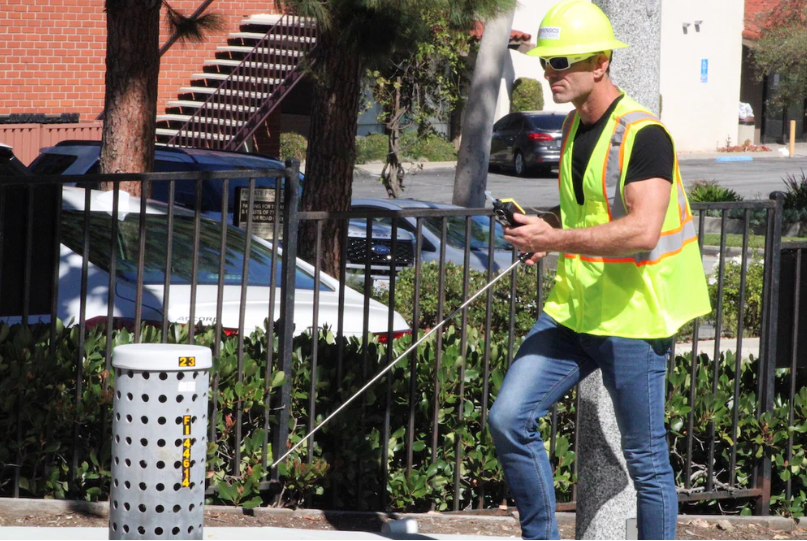Gas leak detectors play a important role in finding dangerous and potentially devastating gas leaks. Explosive gas leak detectors play a vital role in ensuring safety and mitigating risks associated with these leaks, both in residential and industrial settings. These devices come in various designs to suit different needs, such as gooseneck models for inspection, personal exposure monitors that clip to clothing, probe-equipped detectors for drawing air samples, and wall-mounted units for continuous monitoring. By utilizing the appropriate explosive gas leak detector, individuals and businesses can effectively identify and address gas leaks, ultimately protecting lives and property.
Pros |
Cons |
|
✅ Detect explosive gas leaks and accumulation ✅ Having a reliable gas leak detector is crucial in ensuring the safety of your home and loved ones. ✅ Sold by popular stores like Lowe’s and Home Depot. ✅ Essential to consider features like sensitivity, accuracy, and ease of use. |
⛔ Cost: Initial purchase and maintenance costs can be high. ⛔ Calibration: Requires periodic calibration for accuracy. ⛔ Application: Proper installation, usage, testing, and maintenance of gas leak detectors are crucial in ensuring they function optimally. ⛔ Lifetime: These detectors do not last forever, so check lifetime specifications. |
Best Explosive Gas Leak Detector?
There are several choices for an explosive gas leak detector. These products also are names combustible gas leak detectors, natural gas leak detectors, or explosimeters. Explosive Gas Leak Detectors with a gooseneck design are primarily made for inspection and probing. Our top 7 picks are here:
- Forensic Detectors Gas Leak Detector
- Klein Tools Combustible Gas Leak Detector
- UEI Gas Leak Detector
- Ridgid Combustible Gas Leak Detector
- Inficon Gas Leak Detector
- Sensit Leak Detector
- Extech Gas Leak Combustible Detector
Explosive Gas Leaks
Gas leaks, such as those involving flammable gases like methane, propane, and butane, are a frequent concern in homes and workplaces. When these gases accumulate in enclosed areas and reach their flammability limits, they can lead to explosions and fires, posing a significant danger to life and property.
It is essential to promptly detect gas leaks to mitigate the risk of potential explosions or fires. Faulty gas pipes, appliances, and ventilation systems are among the common causes of such leaks, which may involve natural gas, propane, butane, and methane.

Gas Leak Detection Methods
Gas leak detection involves identifying the existence of flammable gases in the atmosphere. There are different approaches to detect gas leaks, such as utilizing gas detectors equipped with sensors that can identify particular gas types, visually examining gas pipes, appliances, and ventilation systems, and using soapy water to identify gas leaks by observing the formation of bubbles.
Explosive Gas Leak Detector for Personal Exposure
An Explosive Gas Leak Detector for Personal Exposure is a compact, portable device that identifies the presence of flammable gases in the environment. It alerts users via audio, visual, or vibration signals, enhancing safety in industrial and hazardous settings. These units detect combustible and explosive gases in the range of Lower Explosive Limit (LEL).
These detectors are widely used in sectors like mining, chemical processing, and emergency services, aiding in early gas detection to facilitate prompt evacuation and safety measure implementation.
Explosive Gas Leak Detector for Inspection
An Explosive Gas Leak Detector for Inspection is a specialized tool used for identifying and locating leaks of combustible gases in various settings. It is used to check gas pipelines, industrial plants, ventilation, gas accumulation, confined space gas build up, and utility services. These detectors are used and report measurements in %LEL.
Explosive Gas Leak Detector for Wall Mount (always ON monitoring)
A Wall-Mounted Explosive Gas Leak Detector is a fixed safety device designed to continuously monitor explosive gas leaks in a specific area. It's typically installed in industrial, commercial, or residential settings prone to gas leaks, like factories, utility rooms, or kitchens. These detectors provide real-time alerts, often through loud alarms or connected systems, ensuring immediate awareness of hazardous conditions.
Flammable Gases
Flammable gases, also referred to as combustible gases, are gases capable of igniting and burning when exposed to a spark or open flame.
Examples of common flammable gases include methane, propane, butane, hydrogen, acetylene, ethylene, and natural gas.
It is crucial to handle and store these gases with great caution to avoid accidental ignition and explosions. Ensuring proper ventilation, regularly maintaining gas appliances, and conducting gas leak detection are essential for maintaining safety.

How Explosive Gas Leak Detectors Work
| Detection Method | Technology Details |
|---|---|
| Catalytic Sensors | Heated filament reacts with gas to produce a measurable change in resistance. |
| Infrared Sensors | IR light passes through a sample and the absorbed light is detected, providing a reading of the gas concentration. |
| Semiconductor Sensors | Gas-sensitive film changes its resistance when it comes into contact with gas, producing a measurable change in electrical current. |
Explosive gas leak detectors typically have a lifespan of around 5-7 years, after which they should be replaced to ensure optimal performance. Some detectors also feature advanced options, such as the ability to connect to a home automation system or the ability to detect multiple types of gases.
Overall, explosive gas leak detectors are a simple yet effective way to ensure the safety of yourself and your loved ones. Understanding how these devices work can help you make an informed decision when buying a gas leak detector and can help keep you safe in the event of a gas leak.

What is an explosive gas leak detector?
An explosive gas leak detector is a device designed to detect the presence of flammable gases in the air, such as natural gas or propane. It helps to prevent accidents and potential explosions by alerting users to the presence of dangerous gas leaks.
How does an explosive gas leak detector work?
Gas leak detectors work by utilizing sensors that detect specific gases in the air. When a gas leak is detected, the detector sounds an alarm to alert users of potential danger. Some detectors may also have visual indicators or the ability to send alerts to a smartphone or other connected devices.

What are the important features to consider when choosing an explosive gas leak detector?
When selecting an explosive gas leak detector, it is essential to consider features such as sensitivity, response time, battery life, and ease of use. Additionally, some detectors may offer additional features like self-testing capabilities or the ability to detect multiple types of gases.
How do I install and use an explosive gas leak detector?
Installing an explosive gas leak detector typically involves placing it in the desired location according to the manufacturer’s instructions. It is important to ensure that the detector is positioned correctly and regularly check for proper functionality. To use the detector, simply turn it on and let it continuously monitor the air for the presence of flammable gases.

How often should I test and maintain my gas leak detector?
It is recommended to test your gas leak detector at least once a month to ensure it is functioning properly. Additionally, regular maintenance, such as cleaning the sensor or replacing the batteries as needed, is essential to keep the detector in optimal working condition.
What are the common signs of a gas leak?
Some common signs of a gas leak include a strong odor of gas, hissing or whistling sounds near gas appliances, dead plants or vegetation in the vicinity of gas lines, and a sudden increase in gas bills. If you suspect a gas leak, it is important to leave the area immediately and contact your gas provider or emergency services.

Why is professional gas leak detection important?
Professional gas leak detection services are essential because they utilize specialized equipment and trained technicians to thoroughly inspect and identify potential gas leaks. This ensures the safety of your home or business and can help prevent accidents or damage caused by gas leaks.
What safety measures can I take to prevent explosive gas leaks?
Some safety measures to prevent explosive gas leaks include regularly inspecting gas appliances for leaks, properly maintaining gas lines and connections, avoiding DIY gas repairs, and ensuring adequate ventilation in areas where gas appliances are used. It is also important to educate yourself and your family on gas leak awareness and emergency procedures.
Other types of gas detectors available besides explosive gas leak detectors?

Aside from explosive gas leak detectors, there are other types of gas detectors that can help maximize safety. These include:
- Carbon Monoxide Detectors: These are crucial for detecting the presence of colorless, odorless carbon monoxide, which can be lethal in high concentrations, and warning of potential danger.
- Natural Gas Detectors: Specifically designed to sense the presence of natural gas, these detectors play a vital role in alerting you to potential leaks of this flammable gas.
Can You Smell Explosive Gas Leak?
Yes, explosive gases like natural gas and propane have distinctive rotten egg odors added deliberately by manufacturers. These sulfur-based odorants enable prompt leak detection for safety purposes.
Final Words
Gas detection is paramount in ensuring safety and preventing the potentially catastrophic consequences of gas leaks. When installing and using explosive gas leak detectors, prioritizing safety is crucial. This includes following necessary precautions, conducting regular testing and maintenance to ensure optimal performance, and understanding the specific requirements of your detector, such as calibration needs. Familiarizing yourself with common signs of a gas leak and considering professional gas leak detection services can further enhance safety measures. In addition to explosive gas leak detectors, exploring other options like carbon monoxide and natural gas detectors can provide comprehensive protection. By prioritizing safety and utilizing the appropriate gas detection tools and services, you can effectively mitigate the risks associated with gas leaks in both residential and industrial settings.
About the Author
Dr. Kos Galatsis ("Dr.Koz") is the President of FORENSICS DETECTORS, where the company operates from the scenic Palos Verdes Peninsula in Los Angeles, California. He is a subject matter expert on gas sensor technology, gas detectors, gas meters, and gas analyzers. He has been designing, building, manufacturing and testing toxic gas detection systems for over 20 years.

Every day is a blessing for Dr. Koz. He loves to help customers solve their unique problems. Dr. Koz also loves spending time with his wife and his three children going to the beach, grilling burgers, and enjoying the outdoors.
Read more about Forensics Detectors here.
Email: drkoz@forensicsdetectors.com
Phone: +1 424-341-3886

